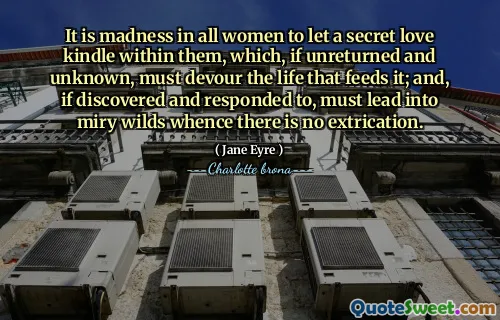
It is madness in all women to let a secret love kindle within them, which, if unreturned and unknown, must devour the life that feeds it; and, if discovered and responded to, must lead into miry wilds whence there is no extrication.
This quote from Charlotte Brontë's Jane Eyre articulates the torturous duality of secret love, particularly from the perspective of women in a historically constrained society. It metaphorically describes the emotional peril of harboring unspoken feelings. When love is secret and unreciprocated, it becomes an internal fire that consumes the lover's vitality and joy. This psychological turmoil manifests as silent suffering that undermines the person’s well-being. Conversely, if the secret feelings are revealed and reciprocated, the resulting entanglement is portrayed as a quagmire—"miry wilds"—from which there is no easy escape. This paints romantic love not just as bliss, but as an overwhelming force fraught with complications, risks, and potential traps.
The quote resonates deeply because it reflects the vulnerability and intense emotional stakes involved in both unrequited and reciprocated love. Its framing suggests a kind of inevitability and doom irrespective of the outcome, highlighting how love’s power can be as destructive as it is life-giving. Moreover, it subtly critiques societal expectations placed on women, who were often expected to suppress their desires, thereby forcing love to become a secret, an internalized burden.
From a broader perspective, this passage prompts reflection on the nature of emotional suffering and passion — that the intense feelings of love, whether realized or not, shape our inner lives profoundly, sometimes to the point of no return. It also challenges the romantic idealization of love found in literature by laying bare the inherent dangers and emotional risks it carries.






